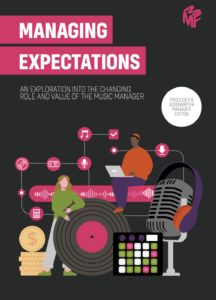Our 2019 report ‘Managing Expectations’ is underpinned by a survey of more than 180 music managers as well as in-depth interviews conducted by Music Ally’s Eamonn Forde with managers representing acts including The 1975, Gorillaz, Mumford & Sons, Robbie Williams, J Hus, Little Simz, Nick Cave, The xx, Blue Lab Beats, Two Door Cinema Club and Bill Ryder-Jones.

In detail, it examines how managers support talent development, their relationships with record labels, the diverse and expanding skills set they require, the challenges around mental health, and the evolving commercial models between music managers and both their creative clients and industry partners.
Other key survey findings include:
The improving diversity of music management: Reflecting wider changes in the MMF’s membership, 42% of survey respondents identified as female, while 20% were non-white. Their client base is also increasingly diverse with 73% representing artists, 42% representing songwriters, 33% representing producers, and 17% representing DJs.
Managers do not operate in a silo: While the majority of music managers assume responsibility for their clients’ recorded and publishing-related businesses, a significant number also oversee social media (76%), PR and promotion (65%), tour management (57%), bookkeeping (48%) and legal services (23%).
Managers are established first-stage investors: Artists, songwriters and producers are increasingly reliant on direct financial backing from their management, particularly in early stage development. 74% of respondents claimed to have invested their own money into current client’s careers. 35% used personal savings, while 40% have received no outside investment.
Live music represents the most significant revenue stream: Followed by recorded/publishing advances, PRS royalties, streaming payments and PPL royalties.
Concerns remain over the commercial sustainability of music management businesses: 26% of respondents work full-time of part-time in another part of the music business – and while 25% earn more than the national average, 56% earn less than £10k per annum from music management, and 21% earn nothing at all.
Drawn from these findings, the MMF have identified five potential barriers that may prevent music managers and their clients from reaching their potential:
- Access To Finance
- Support for Mental Health Provision
- Diversification of Skills
- Transparency on Income Streams
- Revenues and New Commercial Models



